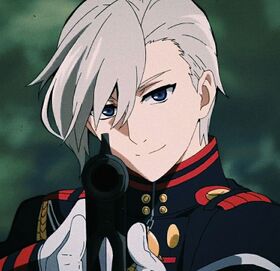Arata Kitagawa
This article is incomplete because it is pending further input from participants, or it is a work-in-progress by one author. Please comment on this article's talk page to share your input, comments and questions. Note: To contribute to this article, you may need to seek help from the author(s) of this page. |
Arata Kitagawa | |
|---|---|
 Arata in 1957 | |
| Nickname(s) | Old Man |
| Born | 15 May 1932 Kyoto, Nihhon-koku |
| Allegiance | |
| Service/ | |
| Years of service | 1952 - 2001 |
| Rank | Captain Major Colonel Brigadier |
| Commands held | Special Air Service |
| Battles/wars | War of Lorican Aggression Post-War of Lorican Aggression Crisis |
| Awards | Distinguished Service Cross Military Medal Legion of St. Georgius King's Volunteer Reserves Medal King's Commendation for Valuable Service Badge of Honour National Medal Erebonian Awards: Emperor's Medal for Outstanding Civil Service Legion of St. Olav |
| Relations | Daidoji Kitagawa (father) Maggie Arseid (mother) Elizabeth Wilkins (lover, later spouse) Kiriya Kitagawa (son) Yamato Kitagawa (grandson) Naoto Kitagawa (grandson) Yukari Kitagawa (granddaughter) Katsuragi Kitagawa (granddaughter) Victor Arseid (nephew) |
Arata Kitagawa (15 May 1932) is a retired Lucis Army officer who served during the War of Lorican Aggression and the Cris that followed it.
Arata is known for his liaison roles during the early years of WoLA, in which he served as an adjutant for his father, Field Marshal Daidoji Kitagawa. Throughout the conflict, Arata was assigned to the Scandinavian theatre where he fought as part of the Special Air Service. Here, Arata demonstrated his abilities as an independent operative. As a result, his commanding officer immediately promoted him to a rank of Captain and led a unit of an SAS company. Later on, he commanded a collective SAS company that were formerly a part of the SOE. In 1972, when he was promoted to a Colonel, He laid the foundation of the modern SAS doctrine and contributed to the modernisation of the Erebonian SAS. He retired in 2001.
He is known for his wits, which he promptly inherited from his father. As a result, Arata developed a keen strategist personality, in which most of his colleagues admire him. His superiors also admire him for his sharp memory.